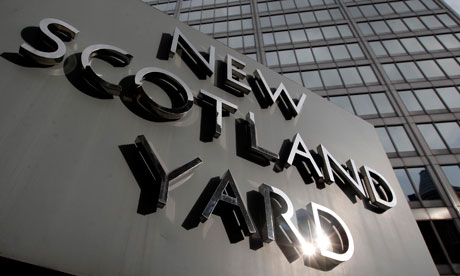
Two teenagers have been arrested as part of a Scotland Yard investigation after computer hackers intercepted a call on a highly sensitive anti-terrorist hotline and leaked it on the internet.
A hacking group named TeamPoison claimed responsibility for the cyber-attack and said it was made in protest at extradition laws. The group uploaded a recording to YouTube apparently consisting of a phone conversation between Met police anti-terrorist hotline staff, as well as two recordings of prank calls it made to the hotline.
The boys, aged 16 and 17, were arrested at an address in the West Midlands by detectives from the Police Central e-Crime Unit, They were arrested on suspicion of offences under the Malicious Communications Act and the Computer Misuse Act. A Scotland Yard spokesman said the pair were in custody.
In a four-minute recording of the conversation between the anti-terrorist staff on Thursday morning, one person can be heard saying that the hotline has been subject to about 700 phone calls "from a group known as TeamPoison". The person is then heard to say: "One of the conversations I had last night was leaked on YouTube."
That leaked conversation is understood to be a prank call from a TeamPoison member identifying himself with the words "Trick, I'm from TeamPoison, I'm Robert West." After a four-minute exchange, the official is heard telling the prank caller that the incident is being referred to the FBI.
In a separate prank call, uploaded by TeamPoison to YouTube on Wednesday, an official can seemingly be heard telling the caller: "You're constantly blocking our phones … People cannot get through when you're constantly coming through here with your phone calls. Other people that need our help can't get through because you're constantly putting this TeamPoison stuff on. It's just getting a bit tedious now."
The Metropolitan police said the hackers had not made the recording via their "internal systems", so the public could be confident of using the hotline in confidence. But the cyber-attack will raise huge national security concerns and fresh questions about the security of sensitive police communications. It comes weeks after a separate group of hackers uploaded what it claimed was a recording of detectives from the FBI, Scotland Yard and other police forces.
The hacker collective said it had also launched a "phone-bombing" attack on the anti-terrorist hotline. This is a similar process to bringing down a website with a denial of service attack. It involves using a computer or computers to send repeated calls to the number to prevent other calls from getting through.
It is not clear how the group recorded the conversation between officials in the police unit. In an interview with Sky News on Thursday afternoon, a person who claimed to be responsible for the interception of the anti-terrorist calls said: "It took no skill whatsoever. It was pretty much an in-and-out job … It was pretty much simple."
The person, who used Skype and had an American accent, added: "We're showing MI6 that they are nothing but jokes and they are the real terrorists. We fear no authority whatsoever. The reason we have been around so long is because we're so knowledgeable. Our main factor is Middle East-related … In a nutshell we really don't care about ourselves more than we care about real people. That's why we're here."
Ailsa Beaton, director of information for the Met, said: "We have throughout the day researched the allegation that the anti-terrorist hotline had been hacked and activists' claims that they were able to listen unrestricted to confidential communications. We are confident the [Met] communication systems have not been breached and remain, as they always have been, secure. We are satisfied that any recording would have been made via the receiving handset only and not from an attack on internal systems. The public can remain confident in the ability to communicate in confidence and that the integrity of the anti-terrorist hotline remains in place."

